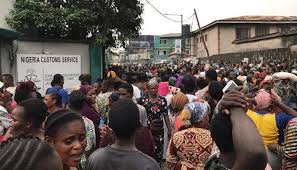STAMPEDE TO DEATH: NIGERIAN GLARING INEQUALITY
by Seyi Lasisi
On March 25, 2024, according to official press releases, four women were killed and one dangerously injured in a stampede. These working-class and poor suffering Nigerians had gathered in Bauchi, to collect cash (of N5, 000) being handed out by a wealthy businessman in the state. Two days prior to this traumatic experience, two Nigerian students were crushed to death in a similar stampede in Keffi. The students and others had gathered to receive free bags of rice. Away from Northern Nigeria, in Southern Nigeria similar deaths occur too. In Port Harcourt, at least 31 people with concrete dreams and a blooming future, were killed during a stampede at a church charity event in Kings Assembly Pentecostal Church.
Rarely does one scroll through media, listen, or read the news without beholding traumatic stories of Nigerians battling hunger, sickness and other infrastructural problems. When someone isn’t crowdfunding for school fees or hospital bills, they’re pleading for assistance to buy food and water. All these are manifestations of how the country is dissipating into crisis. And quite true of the capitalist system, it’s the mass of the working-class and the supposed middle-class, if they exist anymore, that bear the burden of the ruling–elite disinterest in providing solutions to the crisis.
According to the National Bureau of Statistics (NBS), in its official release, Nigeria’s annual inflation rate rose to a staggering 31.70 per cent in February from 29.90 per cent in January. The damaging effects of this staggering inflation rate can be noticed in the sporadic rise of basic goods and services. The price of rice (which is Nigeria’s favourite staple) has witnessed a maddening increase. Sachet water and bottled water has moved from N10 and N100 to N50 and N200 per one, respectively. Cost of transportation has also increased. Owners of small–scale restaurants operating locally have been forced to abandon their trade when they can meet up with the steadily increasing price of goods. For owners of restaurants who still struggle to maintain their business, they have to bleed themselves to recoup their money, not to say gaining meager returns. It’s a vicious circle
Nigeria has been grappling with soaring food prices since the government withdrew a petrol subsidy and floated the naira currency in a bid to shore up the economy. Thus, it’s often ironic when these same politicians and businessmen who are responsible for the hardship in the country decide to become philanthropists. Resources meant for citizens are hoarded and when the elites decide to share them, citizens are compelled to view them as Good Samaritans with good hearts. And in the case of Port Harcourt, Keffi, Bauchi and numerous cases, Nigerians keep losing their lives.

The upward trend in the prices of these staples and other products has weakened the purchasing power of many citizens, making it difficult for many households in the country to afford daily meals. With no increase in minimum wage and unfavorable economic and social conditions, Nigeria has entered an unprecedented crisis period.
Not to despair. Not to keep lamenting. Not to keep complaining in small circles. The Nigerian working-class need to collectively fight against these systematic oppression and hoarding of resources meant for citizens. Socialism remains the only alternative outside of the capitalist ruin that the Tinubu regime. For this to happen however, the working class must organised itself on inside of an independent political platform with which to confront the ruling elites, dislodge capitalism and set out to reorganized the society in a way and manner that the interest and needs of the working masses comes first in every of its political and economic decision. This is the task the Movement for Socialist Alternative has placed before itself. To be a vehicle of bringing socialist consciousness anew to the working class, so as to rise up to its historical responsibility, if you agree with us, why not JOIN US Today so that we can collectively work to achieve this goal of transforming society.
